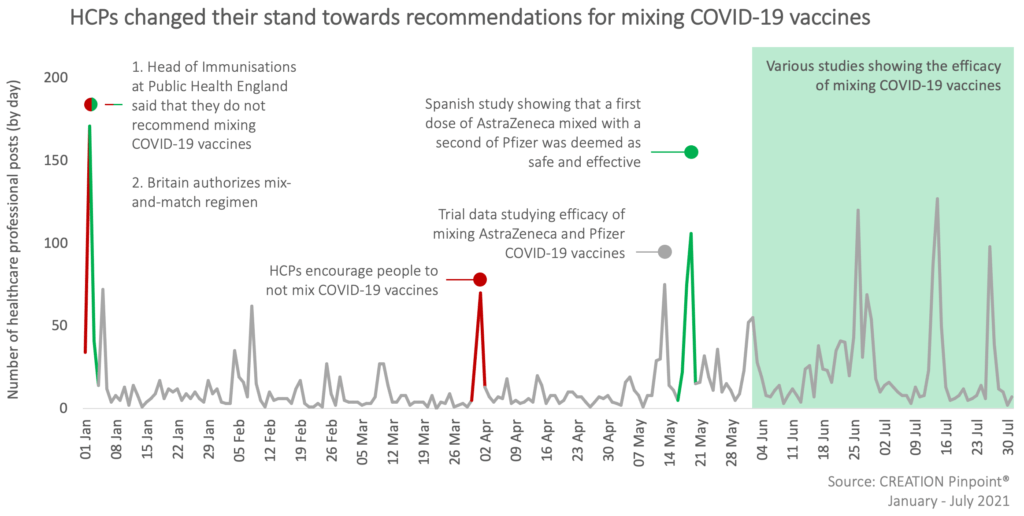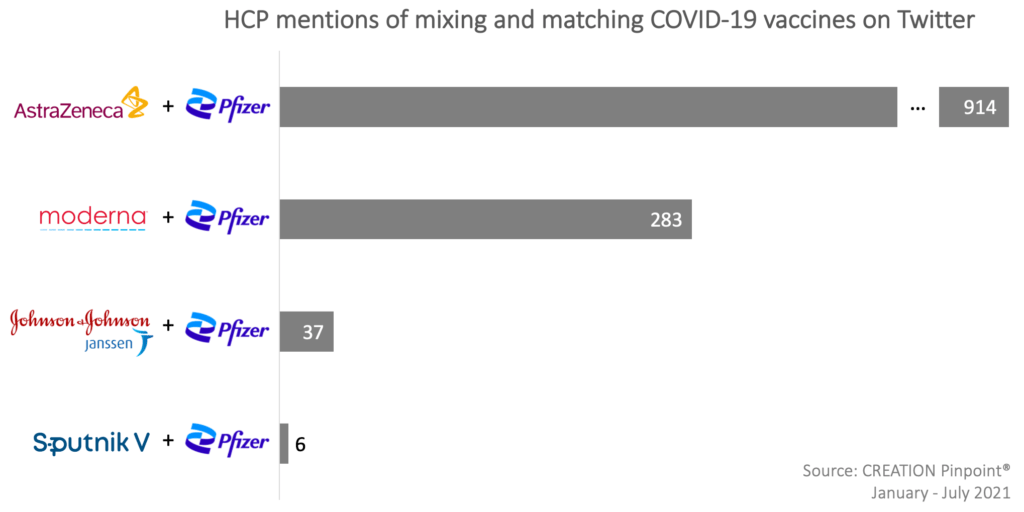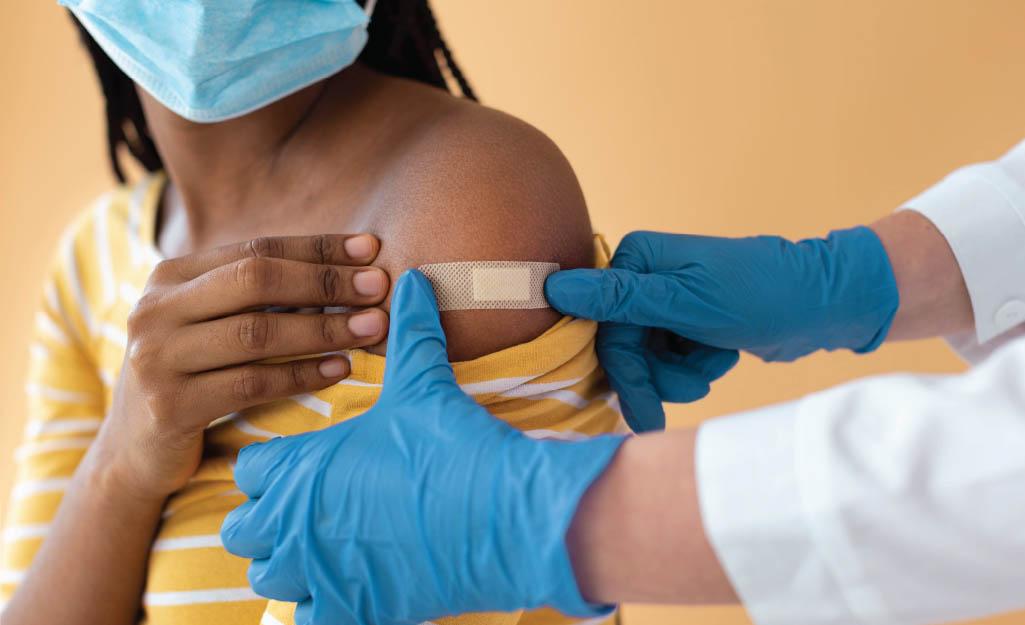Since the beginning of the COVID-19 pandemic, healthcare professionals (HCPs) have discussed various treatments against the virus in order to decrease the number of cases at a global level. HCPs have used their offline and online voices to share safety and efficacy data of treatments and vaccines; and in many cases, they have advocated for a particular treatment or vaccine.
HCPs’ views on mixing COVID-19 vaccines has changed
As HCPs discuss treatments against the virus, a key topic of discussion has been the mixing and matching of COVID-19 vaccines. At CREATION.co, we have analyzed what HCPs have said about this topic online and have found that HCPs showed to be mostly reluctant at the beginning of 2021, yet the perception changed later in the year, during the month of July, and now HCPs mostly advocate for mixing and matching.

From January to April, HCPs mainly shared data and showed distrust towards mixing and matching vaccines as well as reports from health organisations, such as the FDA and Public Health England (PHE), not recommending the approach. Interestingly, while some HCPs shared the communication from PHE rejecting mix and match, others HCPs shared posts saying that Britain will allow for a mix and match regimen, which shows the confusion that this topic had at the time due to lack of clear data.
Head of Immunisations at Public Health England Dr Mary Ramsay says “We do not recommend mixing the COVID-19 vaccines" adding that "If your first dose is the Pfizer vaccine you should not be given the Astrazeneca vaccine for your second dose and vice versa"
— Sky News Breaking (@SkyNewsBreak) January 2, 2021
Britain authorizes mix-and-match #vaccinations. Experts warn #vaccines may not be interchangeable. If a 2nd dose of the vaccine a patient received isn’t available, or the manufacturer of the 1st shot is unknown, another vaccine may be substituted https://t.co/QvWM22WNhV #COVID19
— Marc Gozlan (@MarcGozlan) January 2, 2021
FDA: no mix and match of vaccines, and no delay between the doses.
The FDA Just Ruled You Can't Do These 4 Things With the COVID Vaccines https://t.co/LpnmyYrKf1
— Dr. Mobeen Syed (@drbeen_medical) January 5, 2021
Nonetheless, towards the middle of the year, HCPs started to share data showing the efficacy and safety of mixing COVID-19 vaccines, which brought more clarity to HCPs and the public. One of the first studies mentioned was a Spanish study showing that a first dose of AstraZeneca with a second dose of Pfizer is safe and effective.
Following this, we have seen other HCPs being positive towards mixing and matching vaccines, and more accepting of this practice. This has led to some, including Deena Hinshaw, Alberta’s Chief Medical Officer in Canada, starting to advocate for people to get vaccinated in different countries.
Mixing #COVID19 vaccines was deemed to be safe & was also associated with a robust immune response in a study out of Spain.
This was a 1st dose of AstraZeneca followed by a 2nd dose of Pfizer. The study enrolled ~700 people (18-60).
Preprint to follow. https://t.co/nNu3hh8s6A
— Isaac Bogoch (@BogochIsaac) May 18, 2021
Both Pfizer and Moderna are interchangeable, and it’s safe to mix doses.
We continue to strongly encourage everyone to book the first appointment they can get. Vaccines are readily available at pharmacies and AHS, waiting for you. https://t.co/PGM76TKkgG (3/4)
— Alberta Chief Medical Officer of Health (@CMOH_Alberta) July 14, 2021
HCPs advocate for Pfizer vaccine to be used for follow-up jabs
It is important to note that when HCPs talked about the effectiveness of mixing two vaccines, they advocated for a second dose of Pfizer while the first dose could be different. HCPs mentioned AstraZeneca, Moderna, Johnson & Johnson, and SputnikV for the first dose, and AstraZeneca was the most mentioned vaccine to be combined with Pfizer.

Now, HCPs have started a conversation about having a third vaccine after either having a mix or two of the same vaccine. This is to increase the immunological response by increasing antibodies and thus decrease COVID-19 cases globally. As this topic starts to emerge, and COVID-19 cases are still high, it is likely that mixing and matching vaccines will continue to be a topic of discussion for HCPs this year.
Talking with those who know: personal vaccination strategy for COVID is: 2 doses of AstraZeneca, then hoping for a booster shot of Pfizer later. Higher we get our antibody levels, the more protected we are against virus variants. Increasing data from Europe favors mixing vaccines
— Prof. Peter Doherty (@ProfPCDoherty) May 24, 2021
A year ago I thought an mRNA vaccine is something for a distant future, and 6 months ago mixing one shot of a vector vaccine with one shot of an mRNA vaccine a risky human experiment. Here we go, today I got a Biontech booster 3 months after a first dose AZ myself. What a year!
— Ralser Lab (@RalserLab) June 3, 2021
CREATION.co continues to analyse online HCP conversation on a variety of topics including virtual congress, healthcare changes since the pandemic, product development and therapy area specific insights.
To stay up to date, you can sign up to CREATION.co’s monthly eJournal.
Methodology notes:
- Data for this research was analysed from the online Twitter conversations of HCPs in all languages mentioning mix and match vaccine key words between January 1st 2021 and July 21st 2021.
- CREATION Pinpoint® identified 3,496 healthcare professional (HCP) authored tweets from 2,304 individual HCPs mentioning mix and match vaccine key words.

